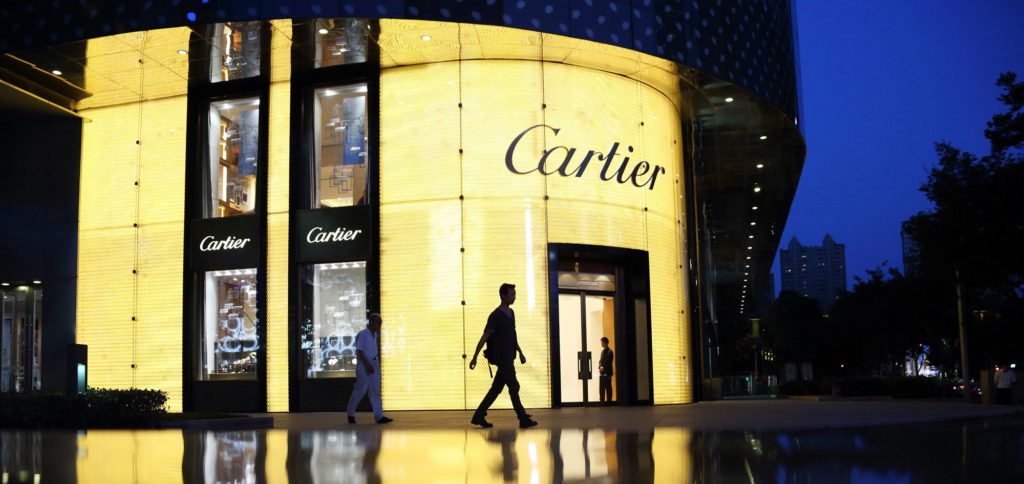(Bloomberg) — Richemont shares plunged the most in more than two years after the Cartier owner said Chinese demand will be slower to recover than expected, clouding prospects for a market that’s fueled the luxury industry’s recent growth.
The Swiss watch and jewelry maker suffered a financial hit in Russia, failed to strike a deal for its online sales unit and forecast rocky times ahead, particularly in the key market of China. The stock fell as much as 14% Friday, losing almost a third of its value this year.
“Even if the worst of Covid is hopefully behind us, we face a global environment which is the most unsettled we have experienced for a number of years,” said Chairman Johann Rupert. “We face volatile times ahead.”
The former investment banker’s comments raise questions about luxury demand, which has defied the recent economic gloom, buoyed by rich consumers who are more insulated from the effects of lockdowns and the cost-of-living crisis. Earlier this week, Burberry Group Plc said profitability reached the highest level in eight years as the UK trenchcoat maker benefited from efforts to make its brand more exclusive.
The chairman said on a call with reporters that his “gut feeling” is that the Chinese economy is going to suffer the impacts of Covid and lockdowns longer than most people think and that the country’s rebound will be slower than that of others. About 40% of Richemont’s stores in that market are currently closed. China, where Richemont has about 3,000 employees, could face a “repeat of 2020” if Covid infections accelerate, Cartier Chief Executive Officer Cyrille Vigneron said.
“The country is going to take an economic blow,” said Rupert, who founded Richemont in 1988. “There will be a temporary contraction.”
He clarified his comments by saying investors shouldn’t expect a triple-digit rebound in revenue from China and that it will be slower than the recent US recovery. Big companies in China are likely to cut jobs, weighing on consumers’ purchasing power, he said.
Richemont executives said revenue growth in the Asia-Pacific region was positive in April despite China. Rupert said the month was “OK.”
‘Feel-Good’
Political polarization in the US and countries like France risks damping the “feel-good factor” that drives luxury consumption, Rupert said. Also, inflation may lead to political demonstrations in some countries, he said.
“I’m worried about the crisis in basic foods,” the 71-year-old South African billionaire said. “We are going to have shortages. People riot when there’s no bread.”
Richemont said the suspension of its business in Russia knocked 168 million euros ($177 million) off of profit. Executives confirmed some of its products were seized in Russia and said the financial charges taken cover its risks in the county. Rupert called costs related to the seizure a “rounding error.”
The company ended the year with 5.3 billion euros in cash, which the chairman said is a “source of strength.” Richemont also announced a special dividend.
Operating income missed analysts’ estimates at 3.39 billion euros, as marketing and other costs increased more than expected and jewelry operating margins suffered. Sales rose a record 35%.
Full-year profit more than doubled as the maker of Vacheron Constantin Swiss watches benefited from a bounceback from the pandemic.
‘The Word’
“Caution is the word of the moment,” said Chief Financial Officer Burkhart Grund.
The company said talks with partners for a luxury e-commerce alliance continue, but the process is protracted because it’s complex. Richemont is still in negotiations with Farfetch Ltd. and other entities it declined to identify. The company aims to sell a majority stake in its online business, which operates sites such as Net-a-Porter.
Richemont said it looks “forward to concluding matters in the near future.”
Analysts at Citi said they expected a deal to divest the online luxury business called YNAP with minority stake sales in the business to Farfetch and others. Farfetch shares have lost almost three-quarters of their value this year.
The lack of a YNAP spin-off announcement is disappointing, though if discussions are progressing, that suggests a deal might happen this quarter, which runs through June, the Citi analysts said.
Asked about acquisitions, Rupert said, “Let’s see if things calm down and if prices return to reality.”
The chairman, who has been nicknamed “Rupert the Bear,” said Friday that he would prefer being called “Rupert the Realist.”
“Central banks have behaved irresponsibly,” he said. “The people who did not need money got access to free capital. If you get something for free, you abuse it. Now unfortunately, the party is unwinding.”
The European, U.S. and Japan economies are going to face a “dose of reality,” he said.











